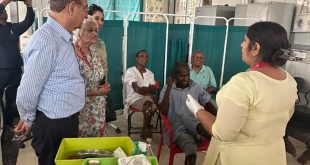India is considered one of the most culturally diverse nations globally. A big part of this culture since ancient times is its queer community.
From the sculptures of Khajuraho to characters like Shikhandi in Indian mythology, the LGBTQIA+ community has played a huge role in Indian culture. In spite of that, the community has long been constitutionally deprived of basic rights like marriage.
On Tuesday, 17th October 2023, the Indian Supreme court announced a verdict on LGBT rights like marriage and adoption. The top court failed to recognise gay marriage and said that the decision lies with India’s legislative.
Supreme Court verdict and the queer community in India
The verdict has “quashed the hopes of millions,” said Queering in Chandigarh (QiC), an LGBT collective based in Indian Union Territory Chandigarh.
A five-judge bench comprising Chief Justice of India DY Chandrachud, Justice Sanjay Kishan Kaul, Justice Ravindra Bhat, Justice Hima Kohli and Justice PS Narasimha, had divided views on the various civil petitions before it.
While the bench concurred that queerness as a concept is a natural phenomenon known for ages and is neither urban nor elite, it said the court can’t make law, but only interpret it.
The justices also said that it is for Parliament to change the Special Marriage Act.
Talking to WION, QiC questioned the bench’s insistence over separation of power, and said: “It is said that separation of powers is the best safeguard for human liberty in a liberal democracy, but what happens when that separation of powers argument comes to hinder the growth and development of a section of the populace of the democracy?”
As per the queer collective, “CJI D Y Chandrachud, while having positivity in his views on the matter, shielded himself and his bench’s decision of not recognising same-sex marriage in India, behind separation of power principle.”
They said that “despite the various arguments that the CJI came up with to show support and solidarity with the community, he failed to bring about a change in the laws of the land.”
‘Hope is not lost’
“In some form or the other (the judgement), quashed the hopes of millions,” said Pranav Puri, a core member of QiC. However, he added that “while today is not the day we get our rights, all hope is not lost.”
“By recognising that homosexuality is not an urban and elite concept, the five judge bench went in direct contradiction to the stand of the union government, who have been in stern opposition of the case,” he added.
Simran Chawla, founder of QiC noted that “while everybody in the community hoped that the decision would be positive, there was a hint of negativity that was harboured seeing the environment of our social-polity.”
However, Chawla acknowledged the merit of CJI Chandrachud’s judgement regarding section 4 of the Special Marriage Act – which deals with polygamy, minimum age of marriage, soundness of mind of the two parties, etc.
“On the aspect of annulment of section 4 of the SMA, I have to stand with the learned CJI, where he said that if we strike down that section, it would send India back to the pre-independence age.”
She said, “while we want our rights to be added to the pre-existing jurisprudence of the country, any action that gives me my right, but infringes upon the right of the other (which is already in place) should not be done so.”
Hemakshi (he/him), who is part of India’s queer community and an active member of QiC emphasised that the journey ahead would be challenging but affirmed the ongoing commitment to the “fight.”
“We appreciate the efforts of the queer activists, lawyers and visionaries who have paved the way for us to reach here. We’re grateful for them, and we’ll continue to join them in this fight,” he said.
 Newspatrolling.com News cum Content Syndication Portal Online
Newspatrolling.com News cum Content Syndication Portal Online






